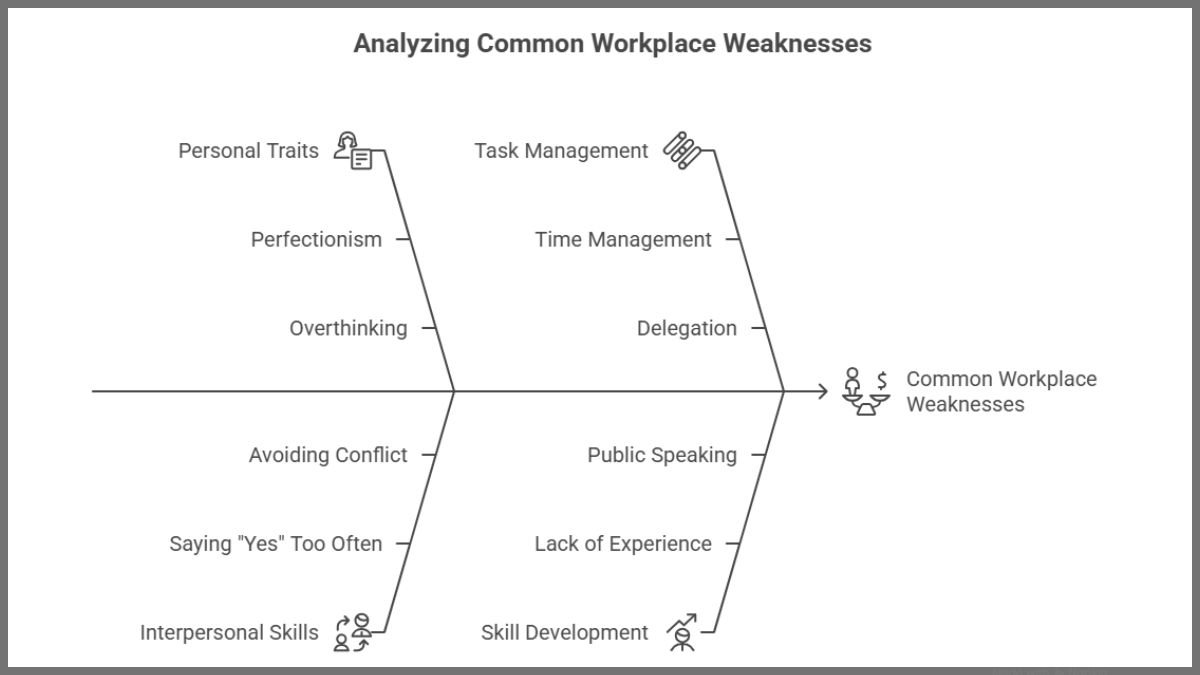Ever feel nervous when asked, “What is your biggest weakness?” during a job interview? You’re not alone. This common question can throw even the most confident candidates off course. But here’s some good news — with a bit of preparation, you can answer it in a way that’s both honest and strategic.
In this blog post, we’ll walk through how to talk about and what weaknesses to mention in job interviews without hurting your chances. We’ll also cover real examples of weaknesses you can mention and how to turn them into strengths in the eyes of your interviewer.
Why Do Interviewers Ask About Weaknesses?
Let’s face it: No one likes to talk about their flaws. So why do employers ask about them?
The main goal of this question is not to trip you up. Instead, interviewers want to learn:
- How self-aware you are
- Whether you take initiative to grow
- If you’re honest and able to own your shortcomings
It’s okay to have weaknesses—we all do. What matters is how you manage them and what steps you take to improve.
For more tips on interview preparation, check out this guide on job interview do’s and don’ts.
Picking the right weakness to mention is crucial. Choose something genuine but not something that would make an employer question your ability to do the job.
Here’s a simple rule of thumb: Make sure your weakness isn’t a core skill required for the role.
For example, if you’re applying for a data analyst job, don’t say you’re bad with numbers. But maybe you can mention that your presentation skills aren’t as strong as you’d like—since communication may not be the main part of the role.
15 Common Examples of Weaknesses to Mention in Job Interviews (And How to Present Them)
Here are some examples of common workplace weaknesses along with tips on how to discuss them without hurting your chances.
1. Perfectionism
Being a perfectionist often means you care deeply about your work. But it can slow you down.
How to phrase it: “I tend to spend a bit too much time perfecting things. I’ve been learning to find a balance between quality and efficiency.”
2. Saying “Yes” Too Often
Do you struggle with saying no? This can lead to taking on too much, which affects performance.
How to phrase it: “I used to say yes to every request, but I’ve learned to assess my workload and prioritize better.”
3. Public Speaking
Many of us fear talking in front of a crowd, and that’s completely normal.
How to phrase it: “Public speaking isn’t my strongest skill, but I’ve been working on it by volunteering to present in team meetings.”
4. Delegation
Do you prefer doing everything yourself? It’s tough to let go, especially when you’re passionate.
How to phrase it: “I sometimes struggle with delegating tasks because I want to ensure everything is done correctly. I’ve been working on trusting my colleagues and letting go of control.”
5. Trouble Asking for Help
This often stems from wanting to prove yourself capable—but no one succeeds alone.
How to phrase it: “I’m naturally independent, so I used to avoid asking for help. Now, I remind myself that collaboration often leads to better results.”
6. Impatience
If you get easily frustrated when projects move slowly, you may be impatient.
How to phrase it: “I can get impatient when things progress slowly. But I’ve been learning to adjust my expectations and respect other people’s processes.”
7. Taking Feedback Personally
Constructive criticism is hard to hear, especially when you care about your work.
How to phrase it: “I used to take feedback personally. But I’ve been focusing on seeing it as an opportunity to grow.”
8. Lack of Experience With a Skill
Sometimes your weakness is just not knowing something—yet.
How to phrase it: “I’m not experienced in [specific software or tool], but I’m a fast learner and I’m already taking online courses to improve.”
9. Overthinking
Do you analyze every possible outcome before making a decision?
How to phrase it: “I sometimes spend too much time overthinking decisions. I’m learning to trust my gut and move forward with confidence.”
10. Time Management
Everyone struggles with time at some point. The key is how you manage it moving forward.
How to phrase it: “I didn’t always prioritize tasks well, but now I use planners and apps to stay on top of deadlines.”
11. Avoiding Conflict
If you go out of your way to keep the peace, you might avoid important conversations.
How to phrase it: “I tend to avoid conflict, but I’ve realized that clear communication is essential, even when it’s uncomfortable.”
12. Too Detail-Oriented
Focusing on every small detail can slow you down.
How to phrase it: “I love paying attention to details, but I’ve been working on stepping back to look at the big picture as well.”
13. Difficulty Saying “No” to New Projects
Enthusiasm is great — until it leads to burnout.
How to phrase it: “I get excited about new opportunities, which can sometimes stretch me thin. I’m learning to pause and assess current commitments before diving in.”
14. Fear of Taking Risks
If you prefer to play it safe, it might mean missed opportunities.
How to phrase it: “I tend to stick with what I know, but I’m making a conscious effort to step out of my comfort zone and try new approaches.”
15. Struggling With Spontaneity
Do you like having everything planned and feel uncomfortable with last-minute changes?
How to phrase it: “I work best with structure and planning, so last-minute changes used to throw me off. I’m learning to adapt quickly and stay flexible.”
Tips for Talking About Weaknesses Effectively
So now that you have an idea of what to say, here are a few final tips to keep in mind:
- Be honest, but keep it professional. Don’t bring up personal issues or unrelated topics.
- Always mention action. Share what you’re doing to improve your weakness.
- Stay confident. Talking about a weakness doesn’t mean you’re not capable—it shows you’re growing.
Final Thoughts: Turn a Weakness Into a Strength
No one is perfect, and interviewers know that. What matters most is how you handle your weaknesses and what steps you take to become better.
Instead of fearing this question, look at it as an opportunity. It’s your chance to show employers that you’re thoughtful, self-aware, and open to growth—qualities that are highly valued in any role.
Next time someone asks, “What’s your biggest weakness?”, you’ll have a thoughtful, well-practiced answer that leaves a lasting impression.
Want to feel even more prepared? Take a moment to reflect on your past jobs. What challenged you, and how did you handle it? That might just be the perfect story to share at your next interview.
Good luck—you’ve got this!





